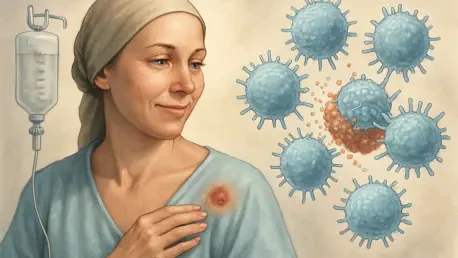
The human immune system stands as a formidable biological fortress, meticulously designed to identify and annihilate threats ranging from common viruses to nascent cancer cells, but a landmark analysis has illuminated a disturbing scenario where this defense system's own soldiers can be corrupted

The stark reality that a patient's survival from head and neck cancer can differ by nearly double based on their ancestral background has long presented a profound challenge to the medical community, prompting a deeper search for answers beyond established social and economic factors. A

Deep within the intricate architecture of the human immune system, a component long considered a minor structural element has now been revealed as a master switch capable of fundamentally rewriting the rules of engagement for our body's most prolific defender. For decades, the elegant Y-shaped

A pivotal study in precision oncology is poised to reshape how clinicians approach cancers driven by specific genetic alterations, offering a detailed roadmap for identifying and treating mutations that have long been underrecognized. Led by Dr. Wei Yang and his team, the research introduces a

A groundbreaking personalized cancer therapy that essentially teaches a patient's own immune system how to recognize and destroy their specific tumor has delivered remarkable results in its initial human trial, signaling a potential new era in the fight against advanced solid tumors. This

A recent clinical trial has successfully demonstrated that treating a rare and aggressive skin cancer with immunotherapy before surgery can completely eliminate tumors in the majority of patients, heralding a profound shift in how this formidable disease is managed. The groundbreaking research,